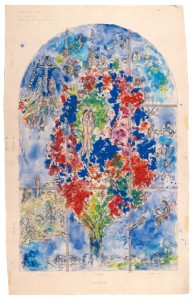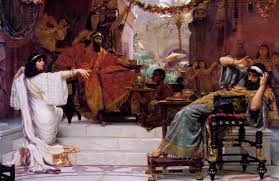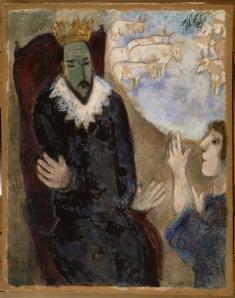A teaching of Moshe Chaim Efraim, from Degel Mahane Efraim, Parshat Acharei Mot.
וְכִפֶּר הַכֹּהֵן אֲשֶׁר יִמְשַׁח אֹתוֹ וַאֲשֶׁר יְמַלֵּא אֶת יָדוֹ לְכַהֵן תַּחַת אָבִיו וְלָבַשׁ אֶת בִּגְדֵי הַבָּד בִּגְדֵי הַקֹּדֶש And the Kohen, the one who is anointed, who is invested to serve in his father’s stead, shall effect atonement, and he shall don the linen garments, the holy garments. Leviticus 16:32
This verse is difficult, for it would have been sufficient to say “the Kohen shall wear the holy clothing.” Why the lengthy wording “the one who is anointed, who is invested to serve in his father’s stead”? The great Torah commentators have said many things on this verse, picking up the nuances within it, each explaining it and renewing the holy Torah in his own way, given to him by God according to his own form of divine service, and surely there are wonderful secrets in each and every letter. Now let us too say in our own way what God has graced us in His mercy and great lovingkindness to say.
Let’s begin with the saying of the sages, “The way of Aaron is to love peace and pursue peace, loving his fellows and bringing them close to Torah” (1). Now “pursuing” means never ceasing — but that is impossible! I will explain it with a parable I heard from my [grand]father and master [the Baal Shem Tov], of a wise and skilled physician who was gifted in matters of the human temperaments. When he came to a seriously ill person, he would listen to him and know just the right medicine to give him, though it would be acrid and bitter, and sometimes dangerous or even fatal in the hands of a lesser physician.
By this we can understand the saying of the sages, for it is known that Aaron’s way was that, when there was an argument, he would go to the parties involved and tell each one that the other was pained by their disagreement and wished to make up, and so make peace between them (2). And so he would not only restore peace but also bring them closer to the Torah, for when they considered how the High Priest troubled himself to visit each of them individually, and how he humbled himself before them to repair the damage they had caused themselves, they would be ashamed of their troublesome ways and repent and return to the Torah. But what of a foolish and prideful person, who does not recognize his own lowliness and thinks it only right that the High Priest should come appease him? For such a person Aaron would change his way, pursuing him relentlessly to humble him and show him his own faults, so that he should be able to make peace with his fellow and his Father who is in heaven and return to the Torah. And this is what is hinted at by “to love peace and pursue peace.” Sometimes Aaron would act as peacemaker, but he was also permitted to pursue someone — even though such a thing is not from the way of lovingkindness (hasidut) — because Aaron never did a single thing for himself, but only for the sake of heaven. Thus when the situation called for it he was able to set aside the ways of peace and take up the ways of the world.
Understand, in this he was like the physician of the parable and also by this we can understand our initial verse, which shows us the upright way to behave with our fellows. For the word vekhiper (usually translated “[the priest] shall atone for him”) can also mean “he shall propitiate him” (3); so the Torah commands the Kohen to propitiate his fellow. The tzaddik too, like the Kohen in our verse, must understand again and again how to purify his fellow Jews from their iniquity, and which Kohen can do such a thing? The one who is anointed by God for the task…who is free of selfishness and has no desire but to serve God. Such a person may don the “holy garments” of his station, that is, sometimes he assumes a role and a way of being that is not really his nature, but which he takes on in the service of God. For example, he may act sternly in order to humble a person who needs humbling, but all the while he is aware that it is not he who acts in this way, but rather it is as if the clothes of his station do so, and he is able to act in this way only because he has no desire of his own but to serve G0d.
_______________________________________________________
1) Pirkei Avot 1:12 2) Avot d’Rebbe Natan 12:3 tells the following: How should one “love peace”? Love peace between fellows, like Aaron did, as it says, The teaching of truth was in his mouth, and injustice was not found on his lips; he walked with Me in peace and with fairness, and turned many away from iniquity. (Malachi 2:6) Rabbi Meir says: Why does it say, and turned many away from iniquity? When Aaron walked along the road and met an evil man, he greeted him. Later, if that man wished to sin, he would say to himself, ‘Woe is me! How will I face Aaron afterwards? I’ll be ashamed, for he greeted me.’ As a result, he will not sin. When two men fought, Aaron sat with one of them and said, ‘Son, let me tell you what your friend is doing. He beats his breast and tears his clothing, crying, Woe is me! How can I face my friend after mistreating him so? I am terribly ashamed of what I did to him. Aaron stayed with him until he had removed all resentment from his heart. Then he would sit with the other and say the same thing, until he too no longer resented his friend. When the two met they would hug and kiss each other. That is why it says [when Aaron died], The entire family of Israel mourned Aaron for thirty days. (Numbers 20:29) 3) as in the phrase akhparah fanav from Genesis 32:21, in which Jacob seeks to make peace with his brother Esau after years of estrangement.
Jeff says…
To my ear, the message in this teaching is all in what the Degel doesn’t say. Perhaps addressing the leaders of his generation, the Degel explains at great length (even this version is abridged) the level of selflessness and disengagement the tzaddik must reach before he can rebuke another. The rest of us (and here’s the silent teaching) must leave off the role of “pursuing” others in our attempt to get them on the right path, and instead take the way of “loving.” This means doing so even at the expense of what we are convinced is the truth. If even Aaron the High Priest was willing to forgo the objective truth in pursuit of peace, then we should be able to leave off our own subjective understandings for that same goal. Any other way, according to the Degel, is not the way of hasidut.








